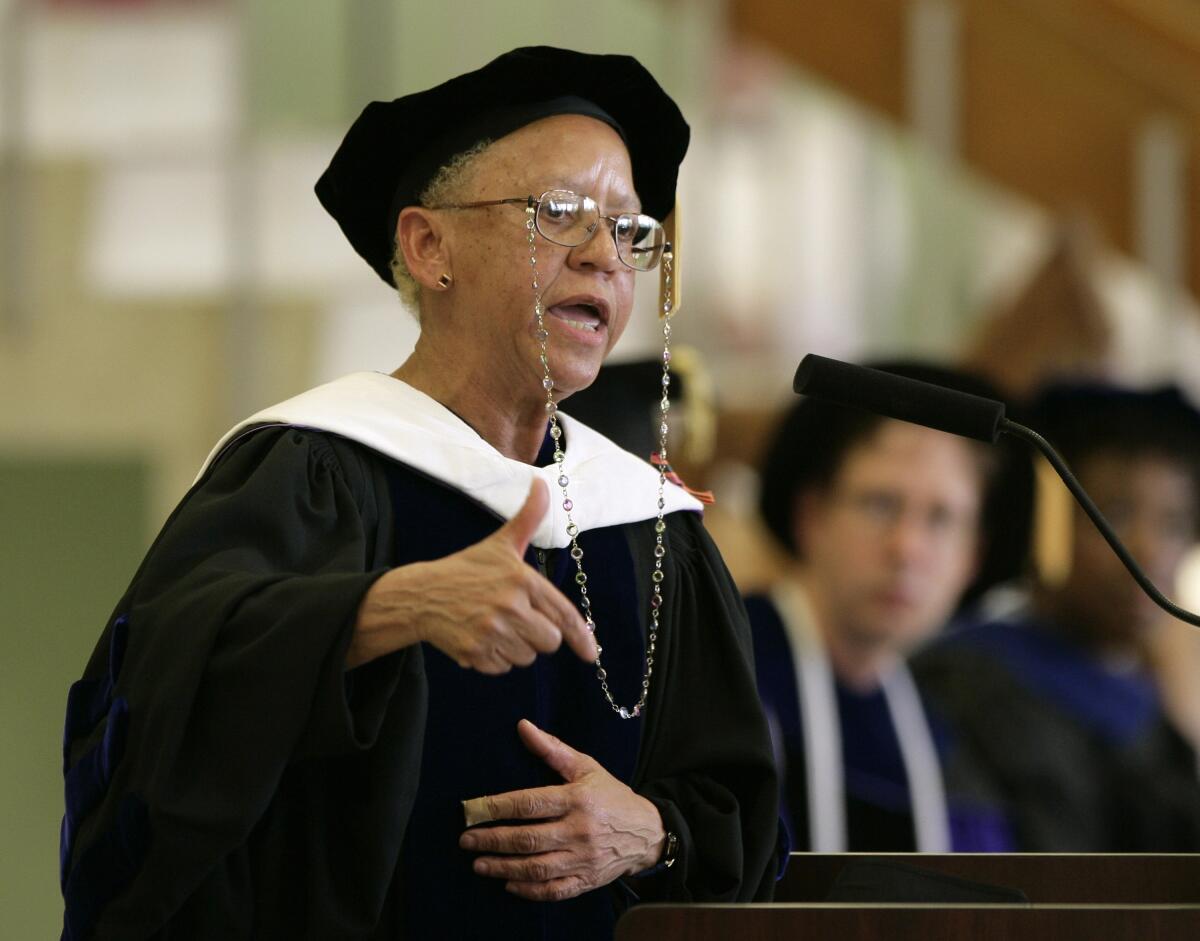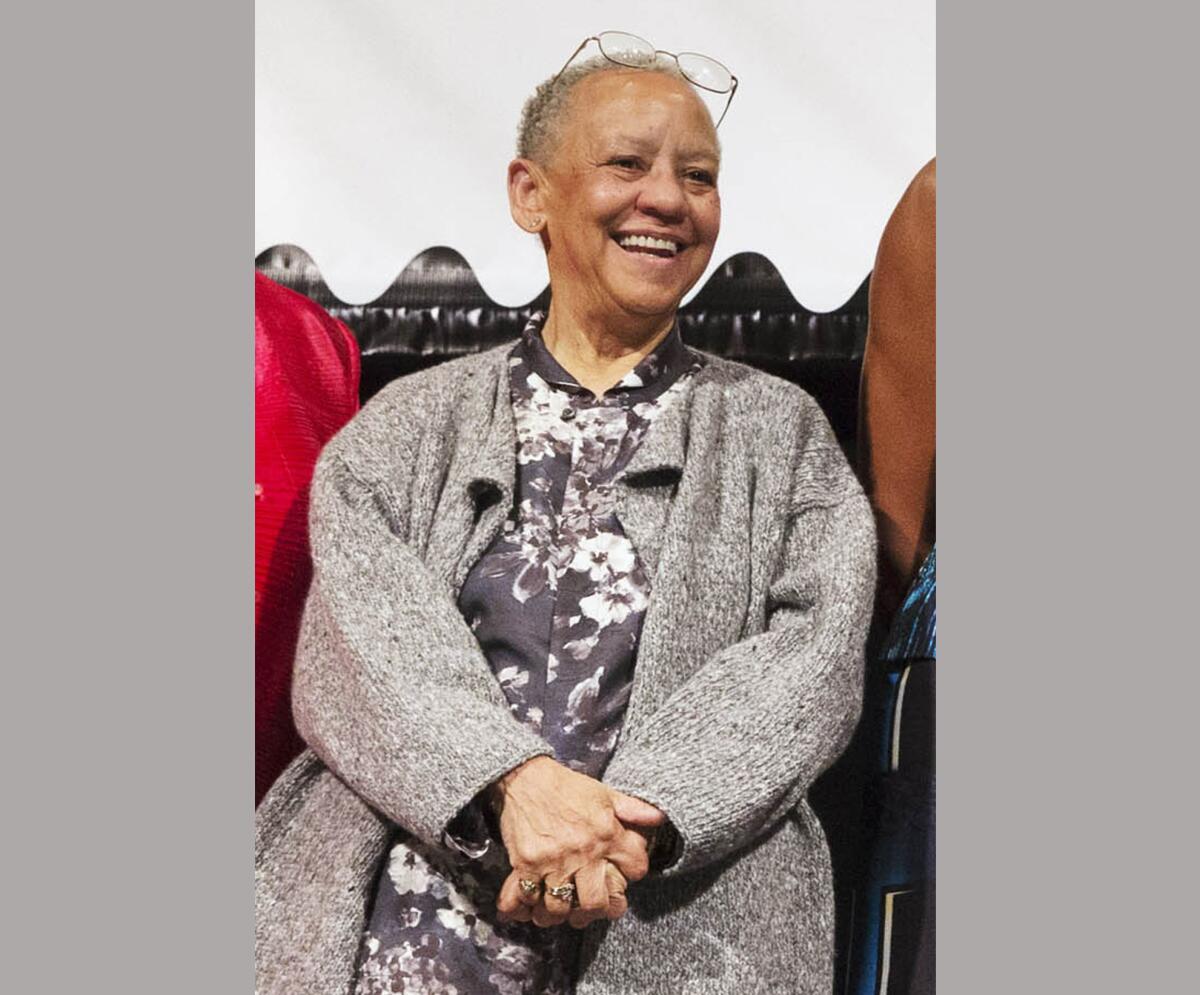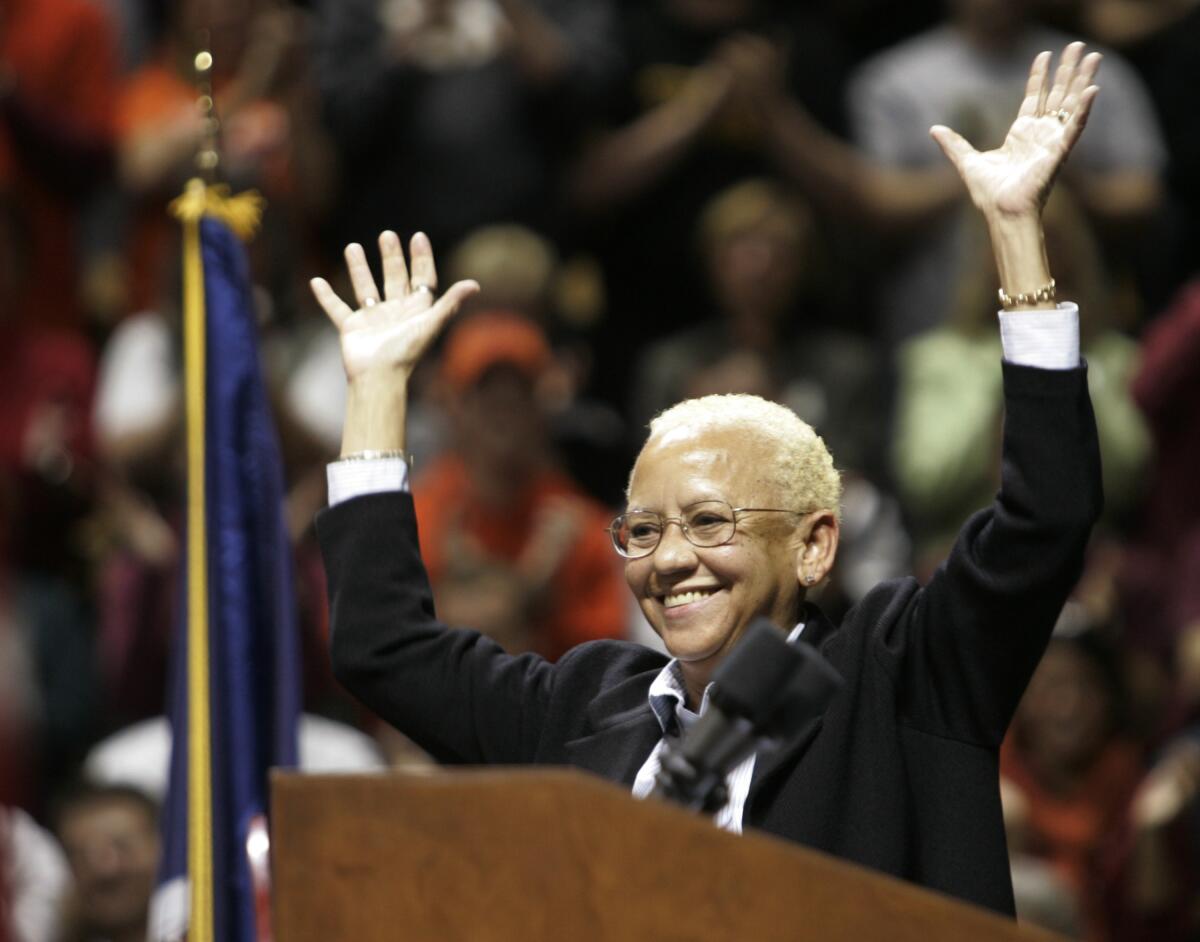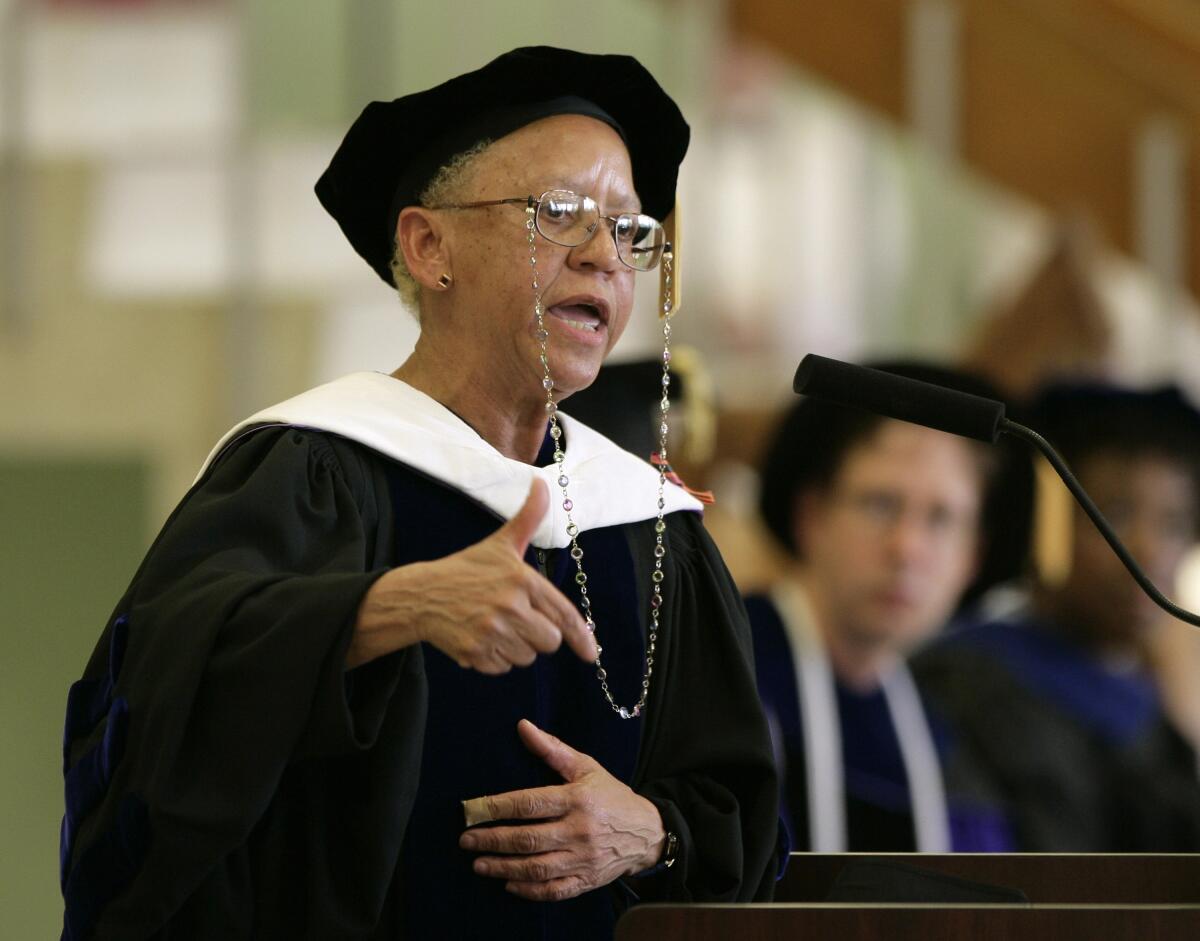Poet and civil rights activist Nikki Giovanni, a prominent figure during the Black Arts Movement in the 1960s and ‘70s who was dubbed “the Princess of Black Poetry,” has died. She was 81.
Giovanni died “peacefully” Monday with life partner Virginia “Ginney” Fowler by her side, her friend and author Renée Watson said Tuesday in a statement to The Times. She had recently been diagnosed with cancer for the third time, Watson said.
“We will forever feel blessed to have shared a legacy and love with our dear cousin,” Giovanni’s cousin Allison “Pat” Ragan added in a statement on behalf of the family.
Watson and author-poet Kwame Alexander said that they, along with with family and close friends, recently sat by Giovanni’s side “chatting about how much we learned about living from her, about how lucky we have been to have Nikki guide us, teach us, love us.”
“We will forever be grateful for the unconditional time she gave to us, to all her literary children across the writerly world,” Alexander said in the statement.
Giovanni, born Yolande Cornelia Giovanni Jr., used her voice as a poet to address issues of Black identity and Black liberation. She was best known for her outspoken advocacy and her charismatic delivery and was a friend of fellow wordsmiths Maya Angelou, Sonia Sanchez, Gwendolyn Brooks, James Baldwin and Toni Morrison. She also became friendly with other cultural iconoclasts, including Rosa Parks, Aretha Franklin, Nina Simone and Muhammad Ali.
“My dream was not to publish or to even be a writer: my dream was to discover something no one else had thought of. I guess that’s why I’m a poet. We put things together in ways no one else does,” Giovanni wrote on her website.
Named after her mother, Giovanni was born June 7, 1943, in Knoxville, Tenn. She had an older sister, Gary Ann. Her family later moved north, and she spent most of her childhood in Cincinnati — a period she described in her writing as turbulent because her father was physically abusive to her mother.
Giovanni returned to Nashville in 1961 to attend Fisk, a historically Black university, where she studied history. A voracious reader since girlhood, she was admitted early, before she finished high school. Giovanni edited the university’s literary magazine and helped start the campus branch of the Student Non-Violent Coordinating Committee, the Associated Press said.
But she was expelled after just one semester because of her contentious relationship with one of the the school’s deans due to her political activism and opposition to the school’s stern rules and curfew. Three years later, she re-enrolled under a new dean, who agreed to wipe her record clean.
She completed her degree in 1967 and moved back to Cincinnati, where she edited a local art journal and organized Cincinnati’s first Black Arts Festival.
In 1968, she self-published her first volume of poetry, “Black Feeling Black Talk / Black Judgement.” Her poems grew out of her feelings about the assassinations of civil rights leaders Martin Luther King Jr., Medgar Evers and Malcolm X and the death of her grandmother.
In one of Giovanni’s early poems, “Reflections on April 4, 1968,” marking the day King was assassinated, she wrote, “What can I, a poor Black woman, do to destroy America? This / is a question, with appropriate variations, being asked in every / Black heart.” Her other works, including “A Short Essay of Affirmation Explaining Why,” “Of Liberation” and “A Litany for Peppe,” were described by the AP as militant calls to overthrow white power.
In addition to her adult poetry, she released two films, 13 children’s poetry books and 10 recordings, including her Grammy-nominated “The Nikki Giovanni Poetry Collection.” She was a frequent guest on the PBS talk show “Soul.” A film about her life, “Going to Mars: The Nikki Giovanni Project,” won the U.S. Grand Jury Prize for documentary at the Sundance Film Festival in January 2023. The film utilizes vérité and archival images to give audiences a glimpse into Giovanni’s mind.
“A poem is not so much read as navigated,” Giovanni wrote in her in 2013 book “Chasing Utopia.” “We go from point to point discovering a new horizon, a shift of light or laughter, an exhilaration of newness that we had missed before. Even familiar, or perhaps especially familiar, poems bring the excitement of first nighters, first encounters, first love … when viewed and reviewed.”
After teaching at a few universities domestically and guest lecturing abroad, she was recruited by an English professor named Virginia Fowler to teach creative writing at Virginia Tech.
“We are deeply saddened to learn of Nikki Giovanni’s passing,” the university said Tuesday on X (formerly Twitter). “Nikki will be remembered not only as an acclaimed poet and activist but also for the legendary impact she made during her 35 years at Virginia Tech.”

Nikki Giovanni recites her poem “We Are Virginia Tech” during the May 2007 English department graduation ceremony on the campus of Virginia Tech in Blacksburg, Va.
(Steve Helber / Associated Press)
In 2007, that university became the site of one of the most deadly shootings in U.S. history, with 32 people killed and 17 injured on campus. The gunman — who was also killed — was a former student of Giovanni’s, and she had alerted school authorities previously about his troubling behavior in her class. Giovanni, a former creative writing instructor, said she took some of his writing to the school’s dean and told the dean that she could no longer teach him.
After the tragedy, she was instrumental in rallying people and restoring a sense of morale to a traumatized student body.
“I couldn’t allow him to destroy my class,” she told The Times in 2007. She delivered part of the convocation address at graduation that school year to roaring applause.
“We will prevail! / We will prevail! / We will prevail! / We are Virginia Tech,” she said at the ceremony.
As her spouse, Fowler has become an expert and keeper of Giovanni’s work and legacy. In an interview with the Fight and the Fiddle, Giovanni described how Fowler was an important pillar of support and that she was “so lucky to have found Ginny.”
“Her grandmother was the most important person to her,” Fowler said. “Their home in Cincinnati wasn’t happy because Nikki discovered that she would have to leave or she would have to kill [her father]. She went to live with her grandmother. She asked if she could stay.”
As Giovanni lived, so she wrote. She broke with cultural norms and gave birth to her only child, Thomas Watson Giovanni, in 1969, when she was 25 because “wanted to have a baby and I could afford to have a baby.” She told Ebony magazine that she didn’t want to get married and “could afford not to get married.” In her 1971 extended autobiographical statement, “Gemini,” she detailed her life growing up as a young single mother, which was taboo at the time.

Nikki Giovanni appears at the 2015 unveiling of the U.S. Postal Service’s Maya Angelou Forever Stamp in Washington, D.C.
(Jacquelyn Martin / Associated Press)
“Her life is the life of Black people,” said L. Lamar Wilson, who was mentored by Giovanni. “She documented it in every art form: film, television … from the 1940s to the present.” Wilson is now a published poet and professor at Florida State University.
Wilson was a reporter and copy editor working at the Atlanta Journal-Constitution when he made the case to report on Giovanni’s appearance in the city in 2007. During their interview, she stopped him and invited him to apply to the creative writing master’s program at Virginia Tech.
“Nikki changed the trajectory of my life. And I’m one of at least 25 people I could name to you who are very famous prominent writers who have the same story,” he said. “She has mentored us, she has been our friend, she has been our surrogate mother when we needed it. She has been our disciplinarian when we needed it, cautioning us about the pitfalls and the pratfalls of the publishing industry and of academia.”
As an educator, Giovanni is crediting with helping usher in a younger generation of Black writers.
Giovanni planned a celebration for “The Bluest Eye” author Morrison before the latter died in 2019. At the celebration, people read their favorite excerpts from her work, moving Morrison to tears.
As a winner of seven NAACP awards and countless more accolades for her achievements in poetry — Giovanni helped up-and-coming writers.
“I think she’s proudest of having opened the door for a lot of future … writers who came after her. They were able to come after her because she had opened doors,” Fowler said. “She is generous, she helps other people, she’s helped other artists, and that’s pretty unusual.”
In 2015, Times columnist Sandy Banks interviewed Giovanni on the heels of the Black Lives Matter protests in Ferguson, Mo.
“I’m not a guru. I don’t have the answers,” Giovanni said when Banks asked about guidance for young writers. “Just trust your own voice. And keep exploring the things that are interesting to you.
“All I can do is be a good Nikki. All you can do is be you,” she said.

Nikki Giovanni delivers closing remarks at a Virginia Tech convocation to honor victims of a mass shooting on the campus in 2007.
(Steve Helber / Associated Press)
Longtime friend Joanne Gabbin — executive director of Furious Flower, the nation’s first academic center for Black poetry — believes Giovanni was proudest of her relationship with her grandmother. “Family is very important. I think it goes all the way back to what her grandmother shared with her, what her grandmother taught her, the values that her grandmother instilled in her,” Gabbin told The Times. “She had made a commitment to her grandmother that whatever she did, it would be excellent.”
In 2016, Gabbin and Giovanni, who had been friends for more than 30 years, were given a preview opening of the National Museum of African American History and Culture in Washington, D.C.
Gabbin said that while touring the museum, Giovanni encountered a “huge kind of a portrait” of herself displayed in the exhibit, marked in history as a literary legend.
Giovanni is survived by Fowler; her son, Thomas; and her granddaughter, Kai.
Kayembe is a former Times fellow. The Associated Press contributed to this report.
